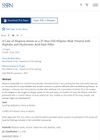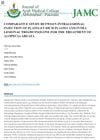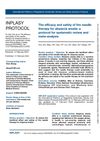 November 2023 in “Cell Biology International”
November 2023 in “Cell Biology International” Tiny particles from umbilical cord stem cells may help hair grow back in a type of hair loss.
 June 2023 in “Dermatology and therapy”
June 2023 in “Dermatology and therapy” The Middle East and Africa need better data, treatment consensus, and support for Alopecia Areata.
[object Object]  May 2023 in “Journal of managed care & specialty pharmacy”
May 2023 in “Journal of managed care & specialty pharmacy” Alopecia areata causes hair loss and life quality issues; current treatments are often unsatisfactory, but new drugs like JAK inhibitors show promise.
 May 2023 in “International Journal of Trichology”
May 2023 in “International Journal of Trichology” Tofacitinib may be an effective and safe treatment for hair loss in teenagers with alopecia areata.
 April 2023 in “International Journal of Research in Dermatology”
April 2023 in “International Journal of Research in Dermatology” Baricitinib is a promising treatment for severe alopecia areata with minimal side effects.
 April 2023 in “Journal of Investigative Dermatology”
April 2023 in “Journal of Investigative Dermatology” Higher PD-1 levels are linked to fewer immune cells in hair follicles in alopecia areata.
 April 2023 in “The journal of investigative dermatology/Journal of investigative dermatology”
April 2023 in “The journal of investigative dermatology/Journal of investigative dermatology” People with alopecia areata have fewer IL-10 producing immune cells, which might contribute to the condition.

Baricitinib is a new, effective treatment for advanced alopecia areata but is costly and has risks.
 February 2023 in “Journal of vaccines and immunology”
February 2023 in “Journal of vaccines and immunology” Alopecia areata causes sudden hair loss, often on the scalp, and can be severe, especially with early onset or related health issues.
 February 2023 in “Medical Clinical Update”
February 2023 in “Medical Clinical Update” Some people with alopecia areata, a hair loss condition, get better within a year without treatment, but it can happen again.
 January 2023 in “Social Science Research Network”
January 2023 in “Social Science Research Network” The document doesn't say if the treatment for hair loss worked.
 January 2023 in “Indian Dermatology Online Journal”
January 2023 in “Indian Dermatology Online Journal” No single ideal JAK inhibitor for alopecia areata has been determined; JAK3 inhibitors may be promising with fewer side effects.
 January 2023 in “International Journal of Homoeopathic Sciences”
January 2023 in “International Journal of Homoeopathic Sciences” Homoeopathic treatment may help restore hair in Alopecia Areata by balancing the immune system.
 January 2023 in “International journal of dermatology, venereology and leprosy sciences”
January 2023 in “International journal of dermatology, venereology and leprosy sciences” People with alopecia areata have different blood markers that suggest inflammation and immune system issues compared to healthy individuals.
 December 2022 in “Rossijskij žurnal kožnyh i veneričeskih boleznej”
December 2022 in “Rossijskij žurnal kožnyh i veneričeskih boleznej” New treatments for child hair loss due to immune issues are effective but not yet officially approved.
 November 2022 in “Journal of Education, Health and Sport”
November 2022 in “Journal of Education, Health and Sport” The skin's bacteria might influence the development of a hair loss condition called alopecia areata.
 October 2022 in “Benha Journal of Applied Sciences”
October 2022 in “Benha Journal of Applied Sciences” Human Beta Defensin 1 levels do not predict the risk or severity of Alopecia Areata.

Screening for iron levels in patients with hair loss may help find a genetic iron overload condition early.
 September 2022 in “Journal of Ayub Medical College Abbottabad”
September 2022 in “Journal of Ayub Medical College Abbottabad” Steroid injections are more effective than platelet rich plasma for treating patchy hair loss.
 September 2022 in “Journal of Investigative Dermatology”
September 2022 in “Journal of Investigative Dermatology” Patient-reported outcomes better reflect the quality of life impact of alopecia areata than traditional severity scores.
 June 2022 in “World Journal Of Advanced Research and Reviews”
June 2022 in “World Journal Of Advanced Research and Reviews” Low-level laser therapy can significantly regrow hair in alopecia areata.
 May 2022 in “Rossijskij žurnal kožnyh i veneričeskih boleznej”
May 2022 in “Rossijskij žurnal kožnyh i veneričeskih boleznej” Alopecia areata is complex, often recurring, and needs personalized treatment, especially with other health issues.
 March 2022 in “Research Square (Research Square)”
March 2022 in “Research Square (Research Square)” A girl with severe hair loss saw hair regrowth after using cannabis.

Fire needle therapy's benefits and safety for alopecia areata need more evidence.
October 2021 in “Book Publisher International (a part of SCIENCEDOMAIN International)” The combination therapy of microdermabrasion and steroid injections is more effective for treating scalp Alopecia Areata than steroid injections alone.
 July 2021 in “PARIPEX INDIAN JOURNAL OF RESEARCH”
July 2021 in “PARIPEX INDIAN JOURNAL OF RESEARCH” PRP injections significantly improve hair regrowth in alopecia areata.
 February 2021 in “Journal of pharmaceutical and biological sciences”
February 2021 in “Journal of pharmaceutical and biological sciences” No cure exists for alopecia areata, and treatments are personalized.
 March 2020 in “Faculty Opinions – Post-Publication Peer Review of the Biomedical Literature”
March 2020 in “Faculty Opinions – Post-Publication Peer Review of the Biomedical Literature” Combining nonablative fractional laser with minoxidil was effective for alopecia areata with only one patient relapsing after a year.
[object Object] January 2020 in “Dermatology Review” Early diagnosis and treatment are crucial for managing alopecia areata, morphea, and psoriasis.
 July 2019 in “International journal of dermatology, venereology and leprosy sciences”
July 2019 in “International journal of dermatology, venereology and leprosy sciences” Oral cyclosporine works better than betamethasone minipulse therapy for treating Alopecia Areata.




























